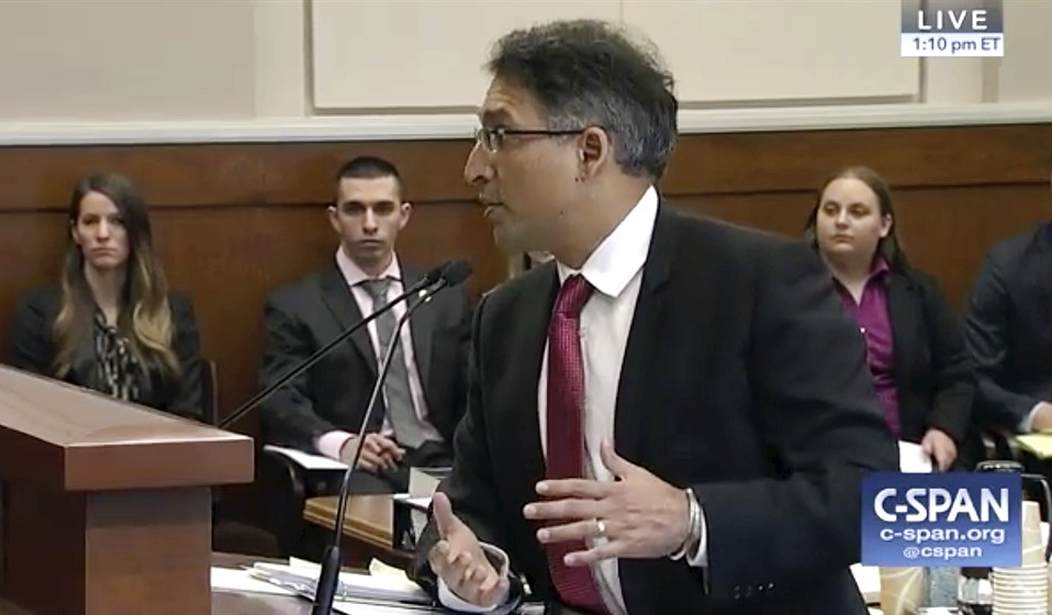Justice Anthony Kennedy might be eyeing retirement; though there are considerable factors that suggest the Supreme Court’s swing vote might stick around a while longer. In fact, there was no retirement announcement on Monday, which increases the odds that he’s staying. So, while we’re on Kennedy Watch, albeit a less intense one, what can we say about President Trump’s other judicial nominations. The first batches of judges for the various circuit courts of appeals were nominated in May. This month, 11 more names were put forward for federal judgeships, where there are over 120 vacancies.
For President Obama’s former acting solicitor general, Neal Katyal, they’ve been an impressive and well-qualified bunch. Speaking at the Aspen Ideas Festival, he was asked about the vetting process and whether it’s likely to provide solid candidates for the federal courts.
“I have actually been quite impressed with the Trump nominees to courts of appeals,” he said. “Some of the most qualified people in my generation, certainly conservative, but I think reasonable, smart, very accomplished individuals, so that’s one—I think—bright spot that we’ve seen.” he added. He quipped that he thought Judge Judy might be nominated by the Trump administration, which added a moment of levity that wasn’t malicious.
That honor goes to Sen. Mazie Hirono (D-HI), who said that Neil Gorsuch was part of the “three horsemen of the apocalypse," when he sided with Justices Samuel Alito and Clarence Thomas in lifting portions of the injunction against President Trump’s executive order on immigration that include a travel moratorium on Sudan, Libya, Yemen, Iran, Somalia, and Syria. Partial enforcement is now permitted.
On MSNBC on Monday, the Hawaiian senator said, “Neil Gorsuch, who I did not support as a Supreme Court justice, he’s joined two of the most conservative justices, Clarence Thomas and Alito on the Court to take the position that the entire injunction should have been lifted. This is like the three horsemen of the apocalypse and they’re waiting for the fourth one to come along so they can go on their trend toward what I call extremism.
Recommended
Wow. Now, that’s eloquence from the gentle lady of Hawaii (sarcasm). Over at Slate, the liberal bed wetting over Gorsuch was just too delicious:
Monday also revealed Gorsuch’s deep hostility to the separation of church and state. He joined Chief Justice John Roberts’ opinion for the court in Trinity Lutheran v. Comer, holding that a state may not constitutionally refuse to subsidize houses of worship. The court, joined by Gorsuch, held that, when a state declines to fund a church’s improvement project, it somehow violates the Free Exercise Clause of the First Amendment. As Justice Sonia Sotomayor noted in her vehement and impressive dissent, Roberts’ opinion held “for the first time” that “the Constitution requires the government to provide public funds directly to a church.” Roberts’ decision is especially noteworthy for its complete rejection of originalism: As Sotomayor painstakingly proved, the United States has a rich history of laws preventing the government from “directing taxpayer funds to houses of worship.” Never before has the court found that these laws somehow interfere with the free exercise of religion.
[…]
Then, finally, there’s the travel ban ruling. In a compromise decision, the justices allowed Trump’s executive order to take effect but exempted “foreign nationals who have a credible claim of a bona fide relationship with a person or entity in the United States.” The order gives the Trump administration most of what it wants, while ensuring that individuals with significant ties to the U.S. will not be turned away at the border. Yet Gorsuch, joined by Thomas and Alito, opposed this compromise: He would’ve let the travel ban take effect in its entirety, as he believes it to be lawful. So much for the fantasy of Gorsuch standing up to Trump.
When Trump first nominated Gorsuch, I was relieved he hadn’t picked an outright lunatic, and I felt cautiously optimistic that Gorsuch might be less of a hard-line conservative than liberals believed. I was wrong. Gorsuch is the worst kind of justice. He is a reactionary who dresses up his cruel, antediluvian views in folksy charm; who professes restraint while espousing extreme, sweeping views; who has no sympathy for vulnerable minorities but believes Christians are being oppressed. And he will guide the course of the law for the next 30 years or more. He is a catastrophe for proponents of civil rights and equal justice. And his influence over the court only stands to grow.
This country is in terrible trouble.
Yes, all of this less than 100 days into his term as a Supreme Court Justice. I suggest the liberal blogosphere take a Valium. He might surprise you, just as Justice John Roberts sidelined conservatives when he voted with the liberal wing of the Court to give Obamacare constitutional protections. The Trinity ruling was about Trinity Lutheran Church applying for a grant to get recycled tires to remodel their playground, which would be open for use by anyone. It’s a playground. That’s not subsidizing a house of worship. Second, President Trump was well within his authority to institute the travel moratorium in his executive order. As a judge, it’s not how you feel, it’s whether this is constitutional—and it was. Very different from I don’t like this; strike it down, which seems to be the basis for liberal legal theory, which some could argue is unprincipled and dangerous.
In all, Katyal’s analysis is the one to go with here. He may not be a conservative in legal theory, but he’s fair, he seems to know that qualifications outweigh the political, and he’s not frothing at the mouth over every thing Trump does.

























Join the conversation as a VIP Member